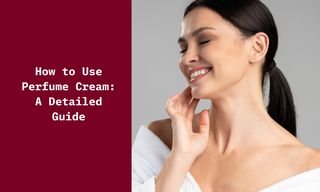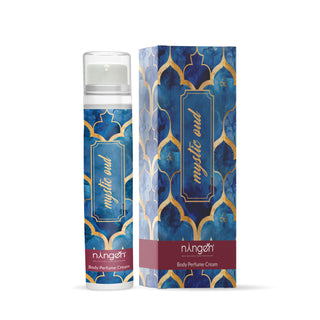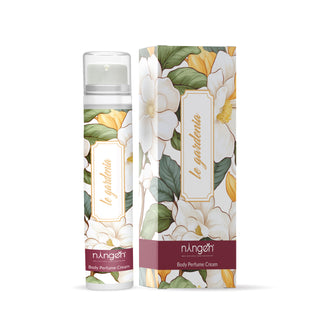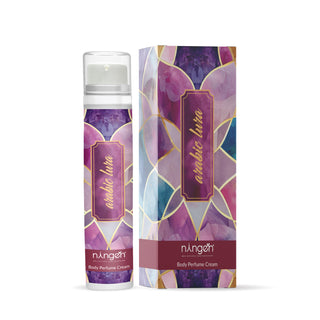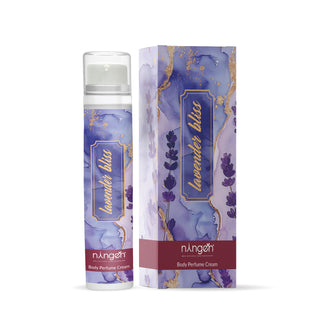Have you ever felt that one whiff is all it takes to be transported to a different place or time; such is the power of fragrance.
Perfume creams, often less talked about than their liquid counterparts, offer a unique and elegant experience in the world of scents.
This article How to use Perfume Cream will gently guide you into the art of selecting and applying perfume cream, reveal the diversity of types available, and provide savvy tips for ensuring your scent lingers lovingly through time. Join us in unfolding the secrets to making the most out of these opulent ointments, and find answers to all your lingering queries in our comprehensive guide.
Table Of Content
Perfume Creams: A Brief Overview
How to Use Perfume Cream?
Different Types of Perfume Creams
Understanding the Importance of Moisturization
Tips For Maximizing Perfume Longevity
Conclusion
Frequently Asked Questions
Perfume Creams: A Brief Overview
Perfume creams, or solid perfumes, offer an alternative to traditional spray perfumes, such as Eau de Toilette and Eau de Parfum. They are compact and spill-proof, making them convenient for on-the-go applications.
Unlike spray forms, which contain alcohol and can be drying, perfume creams lavish the skin with moisture – a boon for those with dry skin.
Typically, they comprise natural ingredients including a combination of essential oils, wax, and sometimes, petroleum jelly, ensuring a more intimate and controlled application while nurturing the skin.
How to Use Perfume Cream?
Perfume cream, distinct from traditional spray perfumes like Eau de Toilette or Eau De Parfum, offers a subtler way to wear your signature scent. Ideal for all skin types, perfume cream is formulated with natural ingredients and perfume oils that impart fragrance and moisturize your skin.
- Start with Clean Skin:
Before applying perfume cream, it's essential to start with clean, dry skin. Cleansing your skin with a gentle soap or body wash removes any dirt, oil, or residual fragrance, ensuring the perfume cream adheres well and blends seamlessly with your natural body scent. After cleansing, pat your skin dry with a towel to remove any excess moisture, as damp skin can dilute the fragrance and affect its longevity.
- Select Your Perfume Cream:
Perfume creams are available in a wide range of scents, from floral and fruity to woody and oriental. Choose a perfume cream that complements your personal preferences and matches the mood or occasion. Whether you prefer light and refreshing scents for daytime wear or rich and sensual fragrances for evenings, there's a perfume cream to suit every taste and style.
- Dip or Scoop:
Depending on the packaging of the perfume cream, you can either dip your finger directly into the jar or use a small scoop provided with the product.Some of the perfume creams are packed in airless pump bottles that accurately maintain hygiene and zero wastage of the product.
- Apply to Pulse Points:
Pulse points are areas of the body where blood vessels are closest to the skin's surface, generating heat that helps to intensify and diffuse the fragrance. Common pulse points include the wrists, neck, behind the ears, and inner elbows. To apply perfume cream, dab or gently massage a small amount onto these pulse points using your fingertips. Avoid rubbing your wrists together after application, as this can alter the scent molecules and diminish the fragrance's potency.
Unlike spray perfume, a perfume cream's fragrance tends to stay closer to your skin, offering a more personal scent experience. Perfume cream often features base notes, like notes of vanilla, which last longer, while citrus scents might provide a refreshing top note that greets the sense of smell first.
Note: If you want to know more about pulse points, click here.
- Layering:
For a more complex and long-lasting scent, consider layering the perfume cream with other fragrance products from the same line, such as body lotion, shower gel, or hair mist. Layering creates a multi-dimensional fragrance experience, with each product contributing its unique scent notes and enhancing the overall olfactory profile. Start by applying the perfume cream as a base layer, followed by complementary products to build depth and complexity.
Layering with a solid perfume or a touch of Petroleum jelly can help create a stronger scent. Keep in mind that the fragrance concentration, along with your skin type, will influence both the intensity and the shelf life of the scent on your body. Always store perfume creams away from direct sunlight to maintain their fragrance and efficacy.
- Reapply as Needed:
Perfume creams typically have a more subtle aroma compared to traditional sprays, making them ideal for everyday wear and close encounters. However, due to their creamy texture and moisturizing properties, perfume creams may require reapplication throughout the day to maintain their fragrance intensity. You can carry perfume cream with you for on-the-go touch-ups, allowing you to enjoy your favorite scent wherever you are.
- Storage:
To preserve the freshness and potency of your perfume cream, store it in a cool, dry place away from direct sunlight and heat sources. Exposure to light, heat, and air can degrade the fragrance oils and alter the scent profile of the cream over time. Keep the jar tightly closed when not in use to prevent evaporation and maintain the cream's creamy texture and fragrance integrity.
Perfume cream, an exquisite and innovative form of fragrance, offers a unique way to enjoy your favorite scents while providing moisturizing benefits to the skin. With its creamy texture and high concentration of fragrance oils, perfume cream is a versatile product that can be applied in various ways to achieve the desired scent intensity and longevity. In this detailed guide, we will explore the step-by-step process of using perfume cream effectively, along with tips on maximizing its benefits and enhancing your overall fragrance experience.
Different Types of Perfume Creams
There are several types of perfume creams, each varying in fragrance concentration and characteristics, designed to cater to individual preferences and needs:
- Solid Perfume: Often made with natural ingredients like beeswax and coconut oil, solid perfumes offer a portable and subtle scent application. Since they typically have lower fragrance concentration, they provide a softer scent ideal for sensitive skin.
- Perfume Oils: Highly concentrated, perfume oils are composed of aromatic compounds in a base oil rather than alcohol. These oils tend to have a longer shelf life and may develop a stronger scent as they absorb into the skin.
- Eau de Cologne Cream: This type has a light fragrance concentration with fresh, often citrus scents that appeal to those preferring a mild yet refreshing aroma on their skin.
- Eau de Toilette Cream: A step up from Eau de Cologne, it provides a longer-lasting scent with a well-composed balance of top, middle, and base notes. It's a common practice for everyday use.
- Eau De Parfum Cream: Exhibiting higher fragrance concentration, this type delivers a stronger scent that lasts longer, and is frequently chosen as a signature scent for its distinguished and persistent notes of vanilla, spices, or florals.
For the perfect perfume experience, select a cream that complements your skin type, leaving your skin moisturized and fragrant.
Understanding the Importance of Moisturization
Moisturization plays a crucial role in enhancing the effectiveness and longevity of perfume cream applications. When the skin is adequately moisturized, it creates a hydrated base that helps lock in the fragrance molecules, allowing them to linger on the skin for a longer period. Dry skin tends to absorb perfume more quickly, leading to a shorter-lasting scent. Additionally, moisturized skin helps distribute the fragrance more evenly, ensuring a consistent aroma throughout the day. By prioritizing moisturization before applying perfume cream, you not only enhance the scent experience but also promote healthier, hydrated skin.
Tips For Maximizing Perfume Longevity
Finding the perfect perfume to define your signature scent can be an exciting journey, involving various fragrance types such as Eau de Toilette, Eau de Cologne, and Eau De Parfum. To maximize the longevity of your chosen scent, there are several tips to consider
Tips for Maximizing Perfume Longevity
- Moisturized Skin: Apply perfume on moisturized skin. Dry skin doesn’t hold perfume as well, so consider a layer of unscented lotion or Petroleum jelly before application.
- Heat Points: Spray or dab your perfume on heat points where blood vessels are close to the skin, such as the wrists, neck, and even the belly button. The warmth helps diffuse the scent throughout the day.
- Avoid Rubbing: After applying, don’t rub your wrists together. This breaks down the fragrance, especially the top and middle notes.
- Correct Storage: Store your perfume bottles away from direct sunlight and heat to preserve the shelf life. Natural ingredients and fragrance oils are sensitive to light and temperature.
- Layering Scents: Use products with similar scents, such as body spray or lotion, to build a stronger scent foundation.
- Reapplication: For Eau de Toilette or lighter scents with a lower fragrance concentration, a midday refresh may be a common practice.
By following these basic principles suggested by fragrance experts, and choosing products for your specific skin type and sense of smell, you can ensure your favorite notes of vanilla, citrus scents, or whatever makes up your ideal natural smell stay with you, countering body odor and maintaining a strong smell throughout the day.
Discover our thoughtfully curated collection of perfume creams. Explore the carefully chosen unique notes featured in the dedicated section below.
The Bottom Line
I hope you found this article on How to use Perfume Cream useful. Perfume cream offers a unique alternative to traditional sprays, particularly beneficial for users with dry skin due to its moisturizing properties. While it may have a subtler scent compared to sprays, its longer shelf life and natural fragrance appeal to many. Consultation with a fragrance expert can help navigate the diverse world of perfume notes, ensuring a perfectly matched and moisturized scent experience.
Frequently Asked Questions
Question 1: What is Perfume Cream?
Answer: Perfume cream, also known as solid perfume, is a fragranced balm that offers a subtle, long-lasting scent. Unlike spray perfumes such as Eau de Toilette or Eau De Parfum, it has a moisturizing base often made with natural ingredients like petroleum jelly or essential oils.
Question 2: How do you apply Perfume Cream?
Answer: Rub a small amount onto pulse points—wrists, behind the ears, and even the belly button, as these areas have blood vessels close to the skin surface, enhancing the fragrance. It's great for dry skin because it hydrates while perfuming.
Question 3: Does Perfume Cream have a strong smell?
Answer: The scent is typically more subdued. Its fragrance concentration means that it releases its base, middle, and top notes gradually, becoming your discrete signature scent.
Question 4: How long does the fragrance last?
Answer: Perfume Cream generally has a longer shelf life and its scent can last for several hours. To extend its life, apply it to moisturized skin.
Question 5: Is it better for certain skin types?
Answer: Yes, those with dry or sensitive skin can benefit from its soothing formula, in contrast to alcohol-based options like Eau de Cologne or body sprays.
Question 5: Can I combine it with other fragrances?
Answer: It's not common practice, as solid perfumes are designed to be the perfect perfume worn alone. Layering might distort the natural smell or lead to an overly strong smell.
Remember, consulting a fragrance expert can help you pick notes like citrus or vanilla that cater to your unique sense of smell.


